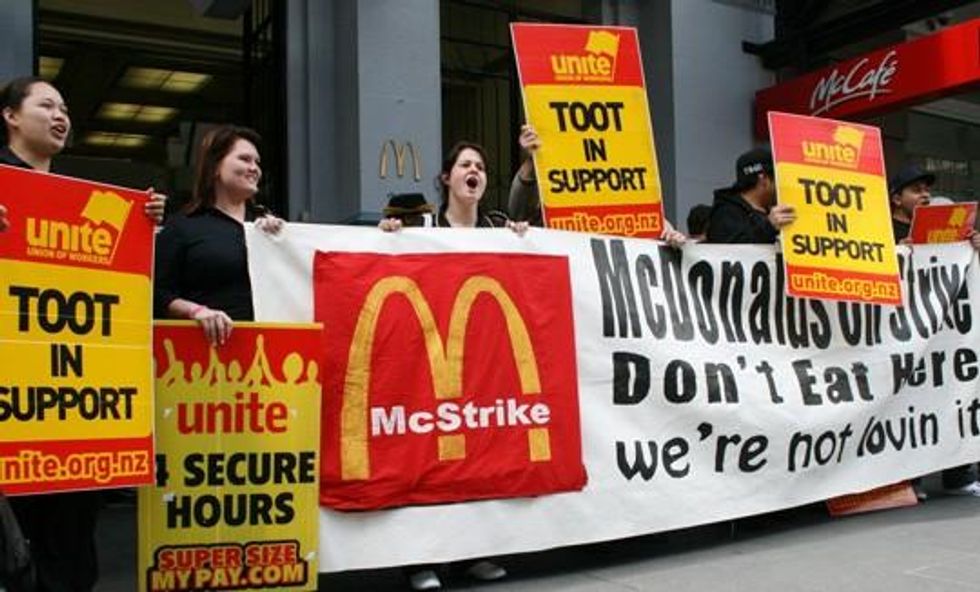It's not my intention to belittle the government shutdown or the political showdown underway between President Obama and the GOP, but more often that not, America's fickle news media is dominated by one subject. It's what gets left out that is often more telling than what everyone (or at least the news) is talking about.
Remember the food stamp fight? It was only two weeks ago that the Republican-controlled House of Representatives passed a bill that would strip $40bn from Snap (the Supplemental Nutrition Assistance Program, aka the food stamp program) over the next 10 years by imposing work requirements and eliminating waivers for "some able bodied adults". The move, which would effectively cut support for millions of poor Americans, was seen by critics as a heartless attempt by House Republicans to hack away at the nation's dwindling social safety net. But, what is more outrageous is that it took a draconian piece of legislation to even get the nation's attention on what has become one of the country's most ignored issues: poverty.
The Pew Research Center's Project for Excellence in Journalism found that out of 52 mainstream media outlets analysed, coverage of poverty amounted to less than 1% of available news space from 2007 to 2012. It's even more astonishing considering that period covered a historic recession.
One of the report's conclusions was that media organizations chose not to cover poverty because it was potentially uncomfortable to advertisers seeking to reach a wealthy consumer audience. As Barbara Ehrenreich, who contributes articles on social issues for Time Magazine, put it:
They don't want really depressing articles about misery and hardship near their ads.
Poverty coverage is seen as non-lucrative, time-consuming and involves high levels of commitment that editors are unwilling to give their reporters in this age of newsroom budget tightening. The greatest irony, however, is that poverty, as Tampa Bay Times media critic, Eric Deggans, told The Nieman Foundation for Journalism at Harvard earlier this year "is in some ways the ultimate accountability story - because, often, poverty happens by design".
In a nation where, according to the US Census Bureau's poverty statistics released last month, 46.5 million people (roughly 15%) of the nation's population lives in poverty, the idea that the media would not cover such a pressing human interest story because of financial troubles is misguided, if not inexcusable. It represents a failure on the part of the industry in fulfilling its role in serving the public interest.
The absence of coverage has left the poor with no voice in American society. As the plight of the nation's shrinking middle class, a central issue in last year's presidential campaign, consistently leads media coverage, the idea of poverty in America almost seems a relic from the past.
Nearly 50 years after President Lyndon B Johnson launched the "war on poverty" program that ushered in social security, Medicare and Medicaid amongst others, you could be fooled into believing that poverty is no longer a public policy problem in the US. Or as former Secretary of Agriculture, Dan Glickman, put it in a US News & World Report op-ed in May:
It feels today like a 'war on poverty' would need to begin with a battle just to gain recognition that poverty even exists.
New media outlets, from blogs like Daily Kos to social media, appear ready to fill the coverage vacuum. There are independent journalists and Twitter activists who prolifically cover issues that affect the working poor from debates on raising the federal minimum wage to securing labour rights. The American Prospect, a left-leaning socially conscious bi-monthly magazine, particularly does great work on highlighting poverty.
The fast-food worker marches this past summer were a watershed moment for poverty coverage in many ways. Mainstream media coverage of the protests was scant (the Guardian a notable exception), but reporting and analysis were available elsewhere online, most notably from Democracy Now!, the independent TV network that ran a feature online titled "Forgotten Poor", offering viewers a glimpse of those struggling to make ends meet.
If this growing underclass of poor Americans continues to be ignored, it will be permanently damaging to what remains of the independent character of US journalism. By bowing to their corporate sponsors in forsaking poverty coverage, the mainstream media is doing a huge disservice to us all by denying us a national discussion on poverty that has not taken place in decades.




